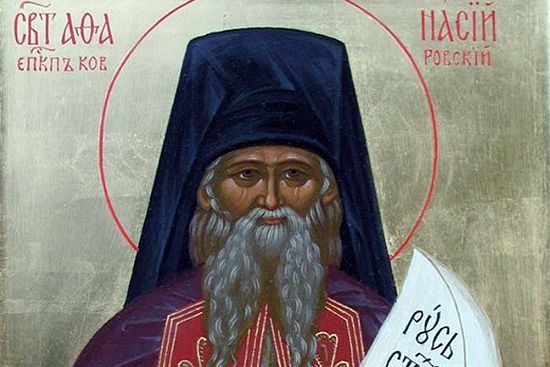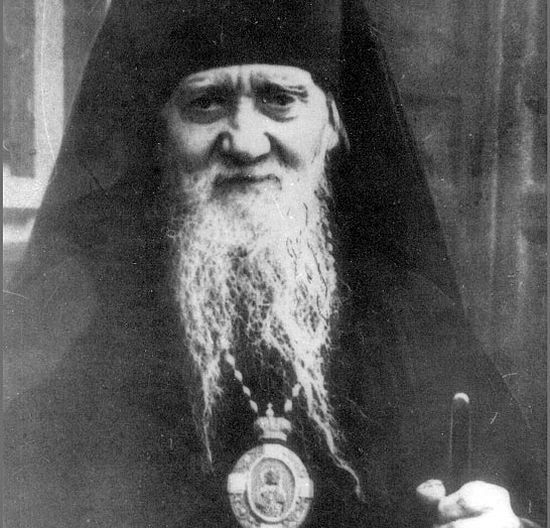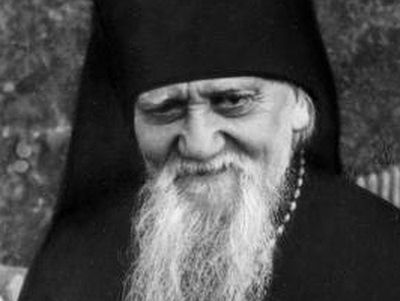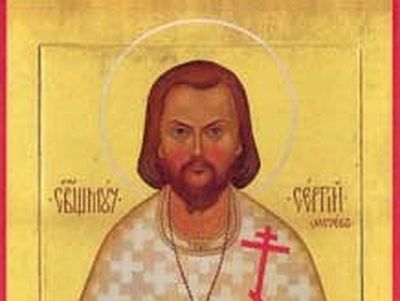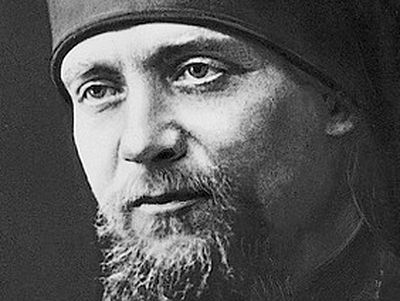Afanasy (Sakharov), bishop of Kovrov, (1887-1962) was consecrated a bishop by Patriarch Tikhon. His personal fate reflected the tragic fate of the Russian Orthodox Church in the twentieth century. He wrote at the end of the 1950s that he served as a bishop for only 33 months, 76 months he spent in exile, and 252 months in prisons and camps, in bonds and hard labor. He was canonized at the Council of Bishops the Russian Orthodox Church in Moscow on August 2000, as a new martyr and confessor of the Orthodox Faith.
We present a translation of one of St. Afanasy's letters to his spiritual children, which he sent to different regions of Russia after his return from imprisonment in 1955. His letters facilitated the return to the Church of many thousands of confessors and righteous laypeople, monks and priests, who had refused to acknowledge not only Patriarch, Sergei (Starogorodsky), but his lawfully elected successor, Patriarch Alexiy (Simansky) as heads of the Russian Orthodox Church. Bishop Afanasy's letters helped to heal the wound that divided Russian Orthodoxy in the 1930s.
The problem that bishop Afanasy addressed in this letter is still relevant and significant, as there are still groups who have separated themselves due to zeal without reason from their mother Church.
We need to closely and carefully read the words of this new Russian martyr and confessor, St. Afanasy, who never put up with falsehood or the trampling of Church canons and who by his whole life had witnessed his faithfulness to Orthodoxy. None of his words should be taken casually or lightly because they were gained through much suffering.
There is another new Russian martyr and confessor, St. Ilarion (Troitskiy), archbishop of Verea, who testifies by his own life and his writings that "there is no salvation without the Church or outside the Church." In his book, There is no Christianity without the Church he painstakingly, in total conformity with the Ecumenical Councils and the teachings of Holy Fathers, shows what it means to belong to the Church.
Please listen and hearken to these words.
Oles Rossich
* * *
It seems to me that you have not yet solved the question of attending the (Patriarchal) churches. As for myself, I have settled this question without any hesitation.
I remember the example of Jesus Christ Himself, who came down to abolish the Old Testament prototype of divine service. Nevertheless, during His whole life, up to the final moment, he participated in divine services being performed by Judaic clergymen, despite the fact that He sternly accused them. The holy apostles also continued to attend the Jerusalem Temple for a long time, evidently until its very destruction in 70 A.D., even after the Christian divine service had finally been established. They had also participated in the already abolished Old Testament services and bowed their heads when High Priests or other priests blessed them in God's name.
The Church of Christ is holy and sinless. Until the Second Coming of Christ, however, only half of (the Church’s) members cannot sin—those who belong to the Triumphant Church of Christ. The second half, the Church Militant on the Earth, is striving for the salvation of sinners and does not reject or drive them away.
In the Earthly Church, God's Grace pours on all Her children maintaining communion with Her through the clergy of the Church endowed with Grace in the lawfully performed sacraments by lawfully ordained priests and bishops.
Each member of the Earthly Church enters into real, sacramental and grace-filled communion with Her and with Christ Himself only through their legitimate spiritual father, under the condition, that the latter is in communion with the First Hierarch, who is recognized as such by all the First Hierarchs of all the other Orthodox Autocephalous Churches constituting in their totality the One Holy Catholic (Ecumenical/Universal) Apostolic Church. There is no other way and there can be no other way for the grace-filled unity with the Ecumenical Church and with Christ Himself to exist, except through this hierarchical chain.
Even the great hermits who lived for decades in absolute solitude always thought of themselves as holding onto this blessed hierarchical chain, and at the first opportunity they hastened to receive the Holy Gifts that had been blessed by the grace-filled servants of the Church. In the Church of Christ, grace is outwardly pouring forth and salvation is achieved not by the clergy per se, but by the Church Herself through Her clergy. The clergy are not creators of grace—they are only dispensers of it. They are like the channels through which the Grace of God pours upon the faithful and without whom it is impossible to receive divine grace.
Hierarchs and priests are both ordained from the ordinary, mortal, and sinful laity because there are no saints here on the earth. The clergymen, even those leading a shameful way of life, continue to remain the dispensers of grace until such time as the lawful Church authority withdraws from them the sacrament of the priesthood and the blessed power to dispense divine grace and to bring the prayers of the faithful to God's altar. To unworthy clergymen the Lord sends His angel to perform the Holy Sacraments. The sacraments performed by unworthy clergyman would be for the judgment and condemnation of such clergyman as well as for the grace-filled blessing of those who accept them with faith.
There is only one circumstance for exception, and that is when a clergyman starts to openly and in public, from the church pulpit, to preach heresy that has already been condemned by the Holy Fathers at the Ecumenical Councils. It gives not only the right but also even the obligation to every clergyman and layperson to break off relations with such a preacher, despite his position in the Church hierarchy, without waiting for the conciliar court.
From Church history we know of many cases when unworthy persons were in high positions, or when patriarchs were heresiarchs. We also know that the Ecumenical Councils, being convoked to discuss and condemn the new heresy, when sending the first, second and the third invitation to those heresiarchs to come to the Council, called them to the very end, "beloved in the Lord". When, and only when, those being invited refused after the third invitation to come to the Council, the Council declared anathema on them. Only from that moment are they and their sacraments deprived of grace.
Take a look, for example, at the history of the Patriarchs of Constantinople in the seventeenth century. The Turkish sultans appointed the Patriarchs and they selected only those who were able to make the larger contribution to the Sultan's treasury. Some Patriarchs held the Patriarchal title for a year, some for a few months, and some for only a few days. There were on the Patriarchal throne even secret Jesuits and Protestant sympathizers. The Sultan used to remove one Patriarch and place another only because the other promised to contribute more money to the Sultan's treasury. How fast and unexpected these changes would occur can be seen by the fact that from 1598 to 1654 there were fifty-four Patriarchs. What a temptation to the faithful!
The life of the Greek Christians at that time was one of continuous suffering. Nevertheless, they did not separate themselves from their pastors and bishops. They also did not avoid attending the churches where the names of Patriarchs, appointed by the Moslem Sultan, were commemorated. Among the Patriarchs of that time was St. Athanasius Patelarius, who had been appointed three times to the Patriarchal throne after paying each time the appropriate amount of money to the Sultan's treasury. He reposed in the Lord in Lubna, Russia and was canonized as a saint.
Also, what a temptation to the Orthodox Russian people was Tsar Peter I’s associate, the head of the Synod, archbishop Theophan Prokopovich—a drunkard and a womanizer. His tempting behavior could have driven some zealots into schism. Nonetheless, it was not the schismatics, but those who prayed in the churches where the archbishop Theophan's name was commemorated who remained in the Orthodox Church and received grace and blessings.
There are many temptations in our days as well. And despite of all the temptations we do not have any valid right to avoid being in communion with the clergy that are in a canonical relationship with Patriarch Alexiy.
The current status of the church administration absolutely does not resemble the one when the affairs of the Russian Church had been administered by Metropolitan Sergiy as a deputy to Metropolitan Peter and by his (the latter's) order (commission). When Metropolitan Sergiy declared that his authority had arisen from Metropolitan Peter's authority, and that he, Metropolitan Sergiy, was totally dependent on Metropolitan Peter, then all of us recognized Metropolitan Sergiy as a lawful leader of the Russian Orthodox Church, of which Metropolitan Peter still remained the First Hierarch.
Later, however, Metropolitan Sergiy openly declared, as was stated in the Journal of Moscow Patriarchate (1933, #1, p.3) that he, "as a deputy of Metropolitan Peter, had not only the temporary authority of the First Hierarch but the Patriarchal Power as well." He also declared that Metropolitan Peter, our lawful First Hierarch, did not have the right "to interfere in church administration or to even fix the mistakes of his deputy." As a result of this, a number of archpastors, including myself, considered that such appropriation by Metropolitan Sergiy of all the authority of our lawful First Hierarch, Metropolitan Peter, while he was still alive, released the Orthodox faithful from the subordination to Metropolitan Sergiy and to his Synod. I sincerely stated this in my letter to Metropolitan Sergiy after my return from exile in December 1933.
Having refused to participate in any church work under Metropolitan Sergiy's leadership, I nevertheless did not avoid attending the churches in which the clergy subordinate to Metropolitan Sergiy conducted the divine services. I considered and still consider the harsh abusive judgments about so-called "Sergianist" churches and about the divine services performed in them as "blasphemy against the Holy Spirit".
True zeal for the faith cannot be combined with anger and malice. Where there is malice and anger, there is no Christ. There is only the inspiration of the dark evil powers. Christian zeal should be with love, maybe with grief, and even with wrath—but without sin ("be angry and sin not"). Malice (anger) is one of the greatest sins. It is an unforgivable sin, it is "the blasphemy against the Holy Spirit," the Spirit of love and the Spirit of grace. Metropolitan Kirill, the most ardent bishop, while admitting non-attendance of Sergiy's churches as a means of protest, nevertheless condemned the abuses of the injudicious and unwise zealots. He said that he himself, in case of mortal need, would confess and take Communion from a Sergian priest.
At the present time, the state of Church affairs is absolutely different from the way it used to be under Metropolitan Sergiy. Metropolitan Peter, of course, is no longer alive. Nobody among us, neither laypeople, nor priests, nor even bishops—but only the first Hierarch of the Autocephalous Russian Church, can be in communion with the Ecumenical Orthodox Church. Those who do not recognize their First Hierarch remain outside of the Church. May the Lord save us from this!
There is no other First Hierarch in the Russian Church except Patriarch Alexiy. All the Eastern Orthodox Patriarchs recognize him as such. All Russian bishops recognize him. And I do not dare to separate myself from him either.
Now there are no commemorating and non-commemorating parishes. It was possible before, as a way of protest, not to attend the churches where the name of the lawful First Hierarch and the name of his deputy both together were commemorated. Now, the name of the Russian First Hierarch Alexiy is commemorated everywhere. Maybe there is something in Patriarch Alexiy's activities that tempts, disturbs and makes some zealots be concerned, but none of these things deprive him or his subordinated clergy of grace.
Patriarch Alexiy and his associates do not preach any heresy condemned by the Fathers of the Church. According to the Church's Canons, this is the only valid reason to break communion even with the Patriarch without waiting for a Church Court. No lawful supreme hierarchical authority has condemned Patriarch Alexiy. So, I cannot say, nor do I have right to say, that he is graceless and that the mysteries performed by him and his clergy are not real. This is why in 1945, while still in prison, I and those priests with me, who did not commemorate Metropolitan Sergiy, after finding out about the election and enthronement of Patriarch Alexiy, unanimously agreed that since there was no other lawful First Hierarch of the Russian Orthodox Church except Patriarch Alexiy, who was recognized by all the Ecumenical Patriarchs, to commemorate him in our prayers as our Patriarch. And since that day, I continue to do so without any hesitation.
With regard to all the activities of the Patriarch and Patriarchate that tempt and bother the zealous ones—it all sits on the Patriarch's conscience and he will answer to the Lord for all that. It is really frightful to deprive ourselves of the grace of the Holy Mysteries just because of something that tempts and bothers us, which in reality is often totally different from what it seems.
So let us not separate ourselves from the Church, let us heartily pray to the Lord that He would make Patriarch Alexiy wiser and that He would help him and all those at the Church’s helm to rightfully divide the word of truth. Let us also pray to the Lord that He would teach and edify us to behave in such a way that we would not act against our consciences, that we would not sin against the unity of the Church, and that we would avoid multiplying temptations in the Church.
I call down God's blessing upon you.
Save yourselves in the Lord.
Prayfully yours, Bishop Afanasy.
9/22 May, 1955
